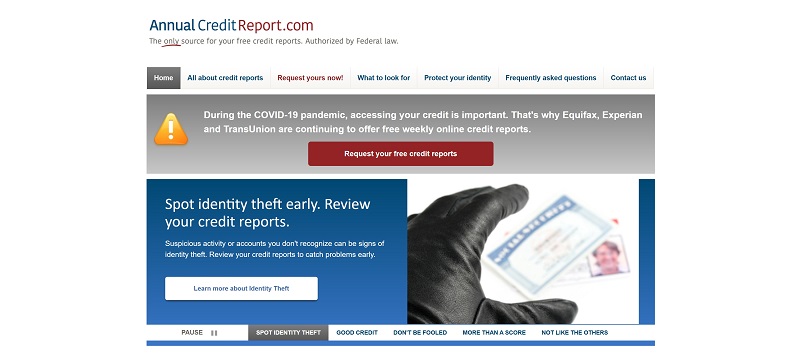How to Clean Up Bad Credit
Some products in this article are from our partners. Read our Advertiser Discloser.
Are you working on paying off debt and building wealth? One important step that goes with that is cleaning up bad credit.
Note that it will take some work to learn how to do this. Having a spotless credit report won’t happen overnight.
However, it’s a vital part of the process of getting out of debt. And it’s important for building wealth.
Today, we’ll go over the steps you need to take to improve your credit score. And we’ll talk about the benefits of cleaning up a bad credit report.
How You Can Clean Up Bad Credit
You’ll be marked as having bad credit if your FICO score is below 580. However, even “poor” and “fair” FICO scores can affect you.
They can affect whether you’re approved for credit borrowing. And they can affect rental applications and job openings. Here are five steps to clean up a bad credit report.
1. Pull Your Credit Report

You can’t clean up bad credit until you know what’s on your report. By law, you can get one free copy of your credit report each year.
The free credit report doesn’t include the actual FICO number. However, you can request your FICO number for an additional fee.
Go to www.annualcreditreport.com to get a free annual copy of your report. Obtaining a copy of your credit report allows you to see what others see when they pull your credit report.
The free annual credit report offered to consumers contains all reported items.
When you get a copy of your report, you’ll see lots of information. You’ll be able to pull reports from all three credit bureaus.
- Experian®
- Equifax
- TransUnion
The Annual Credit Report website lets you see all three reports. They won’t show you your actual score.
However, you can pay a fee to get your score. Each credit reporting company will give you a FICO score. All three scores should be close in number.
I recommend getting a score from at least one company. That way you’ll know where you stand number wise.
2. Analyze the Report Thoroughly
Your report will list all past and present creditors. The accounts will say whether they’re open or closed. They’ll contain your current balances too. Look through each reported item to check for accuracy.
Credit reports sometimes contain errors. They might mistakenly report a bill paid in full as not being paid. Or they’ll report a bill that doesn’t belong to you.
Sometimes these bills are on one’s credit report due to an error. However, other times incorrect credit accounts are an indicator of fraud.
Therefore, it’s important to read your credit report thoroughly. Make sure that all accounts listed on the report belong to you.
And make sure those reports contain the correct outstanding balance along with the correct reporting of payment manner, etc.
If you haven’t been late on payments your report should reflect that. Your credit report will also list any old unpaid bills.
These bills may have gone into collection status. That means the creditor turned them over to a collection agency.
Make a note of old, non-paid accounts. Ensure they belong to you and make a plan to get them paid. We’ll show you how to do that next.
3. Note Items Written Off or Are in Collections
Does your credit report contain an item that says “written off”? This means that the company owed does not expect to be paid.
Essentially, they’re reporting that they’ve exhausted all resources. They’ve tried getting you to pay and have given up.
It’s important to contact these creditors or collection agencies. Make arrangements to pay those bills. Once it’s paid, ask them to change the report to show you’ve paid the bill.
It’s important to pay off any bills entered into collection status. They’ll still show up on your report. However, they’ll be marked paid instead of unpaid.
Do you not have the cash to pay these bills in full? If so, set up a zero-sum budget to help you pay them.
Make a payment plan with the creditor or collection agency. Tell them how much you can pay each month toward the debt.
Follow up with the creditor when the bills are paid. Make sure your credit report shows a “paid” report on the bills in question.
4. Note Balances That are Within 30% of the Limit
Remember how we talked about Credit Utilization Ratio? Credit cards that have balances within 30% of the limit can affect a person’s credit score.
Check to see if you have credit cards that are nearing their limit.
If so, work to get them paid down as quickly as possible. Use your budget to add extra payments to the cards.
Stop using the cards and pay for things with cash. Doing so will raise your FICO score.
5. Resolve any Errors or Disputes
Do you see an item (or items) on your credit report that is incorrect? Or something that doesn’t belong to you?
Contact the listed creditor or collection agency. Work with them to get the error resolved. Most companies are happy to work with you.
You might find that your credit report contains fraudulent information. Or that your identity has been stolen and someone is getting credit in your name.
If so, contact your local police department. Consider working with a reputable fraud resolution company too. They can help you stop the fraud attempts in their tracks.
Those who steal your credit or identity won’t use it for good. They’ll use it to get money or credit in your name. This is why it’s so important to keep track of your credit.
Identity theft is happening everywhere. In 2021, over 4.7 million people were victims of identity fraud according the FTC.
The sooner you can catch credit report fraud, the sooner you can stop it. Don’t let your credit be ruined by identity theft.
It’s one thing if you ruin your own credit. You take your lumps, fix the problems and move on. Don’t let someone else ruin your credit by fraud.
Cleaning up your credit can take work. However, the benefits of having a good credit report will be well worth the effort.
Your reputation is important in today’s world. A person’s credit report is often a direct reflection of a person’s reputation in the eyes of business owners.
6. Use Tools to Build Your Credit
Building credit can take some time. This is true if you build it responsibly while trying to avoid debt. Tools like Self Inc. may be able to help you do that.
Self Inc. can help you build credit in a number of ways. First, Self Inc. lets you monitor your credit score for free.
Second, Self Inc. offers clients what they call a “Credit Builder” account. The Credit Builder account allows you to work on your credit score as you save.
Each month as you pay on time, they report your payments. They report to all three of the credit bureaus. This reporting process helps you build up a history of making “credit” payments on time.
The certificate of deposit (CD) you get is FDIC insured and taken out for the agreed upon length of the loan.
When the loan term is up, you will receive the funds that were stored in the CD. And you’ll get the interest earned on those funds after 24 months. So, Self Inc. is helping you save money and build credit at the same time.
More Facts About Self Inc.
Here are some other facts you might want to know about Self Inc.:
- Self Inc. works like a regular lender. If you make your payment late, they’ll report you as late with the credit bureau.
- You’ll pay a late fee of 5% of the payment amount if you pay late. Your payment is late if it is made 16 days or more over after due date.
- If you have to close your account early, you’ll pay an early withdrawal fee of $1 or less.
You can always pay off your “loan” before the 24 month time period is up. Then you can get your money back early. However, that kind of defeats the purpose. It takes time to build up good credit.
Leaving your money with Self Inc. will help with that. This is a credit builder that allows one to build credit and build savings
Building Credit Without Borrowing
Building up credit with companies like Self Inc. is safe. This is because you aren’t really borrowing money. Instead, you’re making payments to them on your own behalf.
The money you’re paying goes to you. Yet they’re still reporting to the credit bureaus. This way you’re establishing good credit as you save.
You’re not taking on any additional debt. However, you are helping to build better credit for yourself.
This is similar to how a secured credit card works. Secured credit cards have savings balances attached to them.
First, you deposit the money into a savings account. Then, they issue you a credit card with a limit that matches your savings account balance.
As you use the secured credit card, you make payments back to it each month. You can make minimum payments or pay the balance in full.
If for some reason you stop making payments, the company takes the balance due from your savings account.
But the Self Inc. system is better than a secured credit card. This is because there’s no credit card for you to accrue a balance on. You’re only saving; never spending.
Building Good Credit Through Saving
Building good credit through saving means you never have to worry about accumulating debt. Secured credit cards can be risky for that reason.
Yes, the balance is secure because of your savings account match. However, it’s the habit that can be dangerous.
The habit of spending money you don’t have by accruing credit card balances can be risky. It encourages you to live above your means.
Companies like Self Inc. help you build your credit through saving. They eliminate the spending component. This is a credit builder that allows one to build credit and build savings.
Your credit bureau sees your account as a loan. That’s how you can raise your credit score. However, it’s really your own money you’re borrowing. And earning interest on it.
Self Inc. Disclosures: Credit Builder Accounts & Certificates of Deposit made/held by Lead Bank, Sunrise Banks, N.A., SouthState Bank, N.A. each Member FDIC. Subject to credit approval.
Sample loans: $25/mo, 24 mos, $9 admin fee, 15.92% APR; $35/mo, 24 mos, $9 admin fee, 15.97% APR; $48/mo, 24 mos, $9 admin fee, 15.72% APR; $150/mo, 24 mos, $9 admin fee, 15.88% APR. See Self.inc/pricing
Build Credit with Your Debit Card
Another tool you can use to build your credit is the Extra debit card. The Extra Card functions just like a debit car¹. Note: ¹All transaction and account activity is subject to review and approval by both Extra and the Issuing Bank. See Extra Terms and Conditions for more details.
You connect it to the checking account² and use it to make purchases that will be deducted out of that account on the following business day.
Note: ²In order to transact with your Extra Debit Card, you must have an active, Plaid-compatible bank account linked to Extra’s services (“Partner Account”). In the event your Partner Account is disconnected from Extra services for any reason, you will not be able to use your Extra Debit Card. Within 30 days of the date of each transaction made using your Extra Debit Card, Extra will initiate one or more ACH debits to deduct equivalent funds from your Partner Account. These ACH debits typically deduct funds from your Partner Account within 2 to 3 business days after initiation by Extra. You are responsible for keeping track of your available Partner Account balance. If the ACH debit is successful, Extra will report positive payment history to the credit bureaus. If the ACH debit fails and remains unpaid for 30 or more days as of the last day of the month, Extra may report negative payment information to the credit bureaus.
Then Extra reports those debit card purchases as creditworthy purchases to Experian & Equifax.
Don’t have a checking account because of bad credit? Check out our list of banks that offer checking accounts that are designed for people with bad credit.
You won’t be subjected to a credit check when you apply for an Extra Debit Card. In addition, you have the option to earn reward points on all of your Extra card purchases.
The Extra Debit Card offers affordable annual plans.
Why is Cleaning Up Your Credit Important?
You should understand the “whys” before you start cleaning up your bad credit. It’s important to understand the credit reporting system and how it works.
People don’t always understand that the system affects many areas of life. The credit system affects borrowing, renting, and even job hunting.
In this day and age, a person’s credit report is used for many things. It’s not just used for helping a company determine whether to lend you money.
We’ll talk in-depth about how your credit report impacts your life. Then we’ll share how you can clean your credit report up.
When Your Credit Will Be Pulled
Most times, credit reports are used to determine creditworthiness. Credit card companies will pull your report if you apply for a card.
Mortgage companies will pull it to get you approved for a mortgage.
The same goes with car loan companies. However, there are other reasons an organization might pull your credit report. Here are four reasons you might not already be aware of.
1. Renting a Property
Most rental management companies pull credit reports. This is a part of the approval process for renting someone a home or apartment.
They believe that how a person handles credit accounts is important. The thought is that people who pay their bills will pay their rent. And they’ll pay it on time.
Are you looking to rent a quality home or apartment? If so, a clean credit report is important to have.
2. Getting a Job
Many employers these days pull an applicant’s credit report. Their goal? To check the applicant’s level of responsibility in handling their credit.
They’re looking to see if you pay your bills on time. They figure if you manage your credit well, you’ll be a responsible employee.
Conversely, if you have bad marks on your credit record you could lose a job offer. A potential employer may assume you’re not responsible.
It would be sad to miss out on a job you wanted because your credit record misrepresented you.
Don’t miss out on a great job opportunity because of bad credit. Instead, use the tips below to make your credit report sparkling clean.
Clean it up to reflect the person of value that you are.
Let your credit record bring you good things. Don’t let it hinder your life by costing you a job.
3. Auto Insurance
That’s right; auto insurance companies can look at your credit score. They use it to determine how much you’ll pay for auto insurance.
The way they see it, bad credit equals risk. The lower the credit score you have, the higher the risk they take on when insuring you.
Do you have negative marks on your credit bureau? If so, you may need to pay higher insurance premiums.
Conversely, cleaning up bad credit may result in lower auto insurance rates.
4. Determining Loan Rates
You know that your credit will affect whether you get approved for a loan. However, did you know it can affect your rate too?
You could pay higher interest rates if you have bad credit.
A company may decide they’ll lend you money. However, they might charge you more than someone with good credit.
A good credit score might gain a 5 percent interest rate on a car loan. A bad credit score might get you a 12 percent rate instead.
So, even if you get approved you pay a lot more to borrow money. Higher rates can apply to mortgage loans too.
Mortgage lenders will charge you a higher rate to buy a home. When you’re talking about a 30-year loan that can add up.
Let’s say you have good credit. You borrow $200,000 for a home for a 30-year period. You have good credit, so your interest rate is 5 percent.
You’ll pay over $386,000 for the home if you don’t pay the loan off early.
Now let’s say you have bad credit. You qualify for a mortgage with an interest rate of 7 percent. You’re borrowing that same $200,000 on a 30-year loan.
If you don’t pay the loan early, you’ll pay over $479,000 for the home.
That’s a lot of money to pay for having bad credit. Especially when you can take steps to clean it up.
A Bad Credit Snapshot
Credit reports contain information about bills you have now or had in the past. Credit card bills, car loans and mortgage loans are on credit reports.
Even medical, utility and other bills are often contained within a credit report.
Items that can indicate bad credit on a person’s credit report:
- Payments made over 30 days late
- Bills that have been turned over to a collection agency due to non-payment. This can happen even if you weren’t aware you owed the bill
- Loans that you’ve co-signed on for someone else. If they haven’t been paid on time, you get dinged
- Credit cards with balances over 70-80% of the total credit limit
- A high dollar amount total of credit cards owed on
Even if you pay on time, high balances on credit cards can lower your score. This is based on your Credit Utilization Ratio (CUR).
When your CUR gets high, your credit score gets lowered. Try and keep your CUR under 30 percent.
What is a Good Credit Score?
All of the above bullet point factors can affect your credit score. Your credit report contains a number called a FICO score. Your FICO score can range from 300 to 850.
Here’s a breakdown of the credit analyses estimates you’ll get based on your FICO number:
- Exceptional Credit: 800-850
- Very Good Credit: 740-799
- Good Credit: 670-739
- Fair Credit: 580-669
- Very Poor Credit: 300-579
*Source: Experian
What is your credit score? Poor? Excellent? Whatever it is, we can help you clean it up. Just follow the instructions below.
Legit Ways to Get Your Credit Report for Free
If you’re not checking your credit report at least once a year, I recommend doing so. Here is how you can check your credit report for free.
Annual Credit Report
I talked a bit about this above. Have you heard of the Fair Credit Reporting Act? It’s a law that allows consumers to get one free credit report each year.
They can get the report from the three main reporting agencies.
I talked about them earlier. They are Experian, TransUnion and Equifax.
Annual Credit Report is a company that allows you to choose from the three different reporting agencies. You can check your credit report for free through them.
Again, you can access their website at www.annualcreditreport.com. The site allows you to access each of the three reporting agencies’ bureaus once per year.
You have to fill out information regarding your identity to get them, though.
They’ll ask you specific questions about your credit to ensure you’re you.
Getting Your Credit Score for Free
The free credit reports from Annual Credit Report will show you what’s on your credit report. Remember that they charge a fee if you want to know your credit score.
Do you want to get your credit score for free? If so, you can use a company like Credit Sesame. They’ll let you access your credit score for free at any time.
Credit Sesame is a company that helps you improve your credit score. They give regular access to your credit score at no cost. They share tips for increasing that score too.
You can also get your credit score for free using Credit Karma. Credit Karma is a service that makes recommendations on products.
They talk about products you can use to better your financial situation.
What to Do if You Find an Error
When you get your credit report copy for free, it’s important to examine it thoroughly. You’ll want to make sure all of the information is accurate.
Check balances on all outstanding debts listed on your credit report. Make sure the information lines up with what you know to be your debt record.
Did you find any discrepancies or fraudulent activity on your credit report? If so, follow up with the individual bureau(s).
Get more information from them regarding the discrepancies or fraud. Do what you need to do to clear them up. Use the agencies above to help if needed.
You’ll want to take care of any long-overdue outstanding or written-off bills. It’s possible that you might have forgotten about or weren’t aware of these.
Do the research to make sure they’re yours.
Make the necessary calls to get them paid off. Make payment arrangements if you have to. This way you can make sure your credit record gets and stays clean.
Summary
Having a good credit score and a clean credit report is vital. It helps when you want to make a purchase such as buying a home or a car.
You’ll get the best interest rate possible with good credit. And a lower interest rate will help you pay the loan off faster.
Whether you’re applying for a job or trying to get a loan, your credit record matters. It is important to take your credit report seriously.
Work to ensure that it reflects the responsible person that you are.
Don’t let bad credit ruin your reputation. Instead, take steps to clean up your report. Doing so will help you improve your credit score.





What if you have filed bankruptcy? Discharged almost 2 years ago and would like to buy a Townhouse! How do you rebuild!
Thanks.
Thank you for sharing the article. It’s very useful. I hope to hear more from you.
These are all great tips. Simply cleaning up a report of erroneous information can have a positive effect, in a relatively short time period, on a credit score.
You’re exactly right, James! As with many things, a little effort goes a long way. 🙂
I looked at my credit report and found 3 people who are using my name for themselves. How IDK! I reported 1 to the credit reporting agencies and got rid of it.
Oh wow. I am sorry to hear that, but I am glad that you caught it. Hopefully you can get the issue cleared up with all three credit bureaus.
It’s amazing how credit card/credit report fraud is on the rise, Mark. I’m SO glad you have been able to at least get the 1 report off of your credit record. I wish the best of luck to you!
These are great tips. I regularly check my score and report to make sure everything is accurate.
Hey, Brian. That is great to hear that you check your score regularly. I do as well and I use Credit Karma because it is free. 🙂
That’s a smart move on your part, Brian. It’s always good to keep track of the credit score. IMHO.